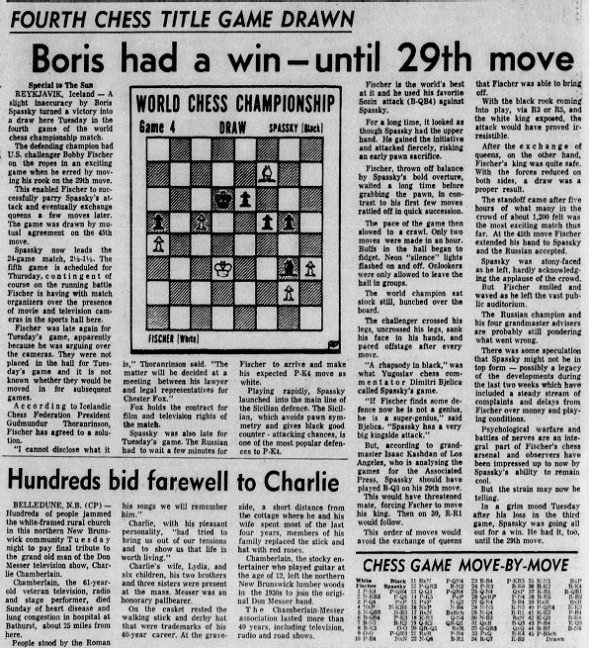The Vancouver Sun Vancouver, British Columbia, Canada Wednesday, July 19, 1972 - Page 38
Fourth Chess Title Game Drawn: Boris Had A Win—Until 29th Move
Reykjavik, Iceland—A slight inaccuracy by Boris Spassky turned a victory into a draw here Tuesday in the fourth game of the world chess championship match.
The defending champion had U.S. challenger Bobby Fischer on the ropes in an exciting game when he erred by moving his rook on the 29th move.
This enabled Fischer to successfully parry Spassky's attack and eventually exchange queens a few moves later. The game was drawn by mutual agreement on the 45th move.
Spassky now leads the 24-game match, 2½-1½. The fifth game is scheduled for Thursday, contingent of course on the running battle Fischer is having with match organizers over the presence of ([disruptive crews of men operating]) move and television cameras in the sports hall here.
Fischer was late again for Tuesday's game, apparently because he was arguing over the cameras. They were not placed in the hall for Tuesday's game and it is not known whether they would be moved in for subsequent games.
According to Icelandic Chess Federation President Gudmundur Thorarinsson, Fischer has agreed to a solution.
“I cannot disclose what it is,” Thorarinsson said. “The matter will be decided at a meeting between his lawyer and legal representatives for Chester Fox.”
Fox holds the contract for film and television rights of the match.
Spassky was also late for Tuesday's game. The Russian had to wait a few minutes for Fischer to arrive and make his expected P-K4 move as white.
Playing rapidly, Spassky launched into the main line of the Sicilian defence. The Sicilian, which avoids pawn symmetry and gives black good counter-attacking chances, is one of the most popular defenses to P-K4.
Fischer is the world's best at it and he used his favorite Sozin attack (B-QB4) against Spassky.
For a long time, it looked as though Spassky had the upper hand. He gained the initiative and attacked fiercely, risking an early pawn sacrifice.
Fischer, thrown off balance by Spassky's bold overture, waited a long time before grabbing the pawn, in contrast to his first few moves rattled off in quick succession.
The pace of the game then slowed to a crawl. Only two moves were made in an hour. Buffs in the hall began to fidget. Neon “silence” lights flashed on and off. Onlookers were only allowed to leave the hall in groups.
The world champion sat stock still, hunched over the board.
The challenger crossed his legs, uncrossed his legs, sank his face in his hands, and paced offstage after every move.
“A rhapsody in black,” was what Yugoslav chess commentator Dimitri Bjelica called Spassky's game.
“If Fischer finds some defence now he is not a genius, he is a super-genius,” said Bjelica. “Spassky has a very big kingside attack.”
But, according to grandmaster Isaac Kashdan of Los Angeles, who is analyzing the games for the Associated Press, Spassky should have played B-Q3 on his 29th move.
This would have threatened mate, forcing Fischer to move his king. Then on 30, R-R1 would follow.
This order of moves would avoid the exchange of queens that Fischer was able to bring off.
With the black rook coming into play, via R3 or R5, and the white king exposed, the attack would have proved irresistible.
After the exchange of queens, on the other hand, Fischer's king was quite safe. With the forces reduced on both sides, a draw was a proper result.
The standoff came after five hours of what many in the crowd of about 1,200 felt was the most exciting match thus far. At the 45th move Fischer extended his hand to Spassky and the Russian accepted.
Spassky was stony-faced as he left, hardly acknowledging the applause of the crowd.
But Fischer smiled and waved as he left the vast public auditorium.
The Russian champion and his four grandmaster advisers are probably still pondering what went wrong.
There was some speculation that Spassky might not be in top form — possibly a legacy of the developments during the last two weeks which have included a steady stream of complaints and delays from Fischer ([and the European organizers, and the Soviet organizers in collusion with Chester Fox, Inc doing everything possible to wreck the match]) over money and playing conditions. ([Actually, in an August 8, 1985 interview with Boris Spassky, the report states: “Many observers thought Fischer's furor sapped Spassky's concentration, but Spassky says the job was done by Moscow. More seriously, he says Fischer was the stronger player at that point in their careers, but “I could have resisted better.”])
Psychological warfare and battles of nerves are an integral part of ([the Soviet]) chess arsenal ([which Fischer is forced to spend his time dodging. Just as Fischer was quoted as saying, “I don't believe in psychology. I believe in good moves.”]) and observers have been impressed up to now by Spassky's ability to remain cool.
But the strain may now be telling.
In a grim mood Tuesday after his loss in the third game, Spassky was going all out for a win. He had it, too, until the 29th move.
 Boris Had a Win -- Until 29th Move 19 Jul 1972, Wed The Vancouver Sun (Vancouver, British Columbia, Canada) Newspapers.com
Boris Had a Win -- Until 29th Move 19 Jul 1972, Wed The Vancouver Sun (Vancouver, British Columbia, Canada) Newspapers.com
























